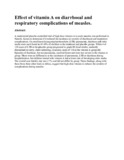| dc.description.abstract | A randomized placebo-controlled trial of high dose vitamin A in acute measles was performed in Nairobi, Kenya to determine if it reduced the incidence or severity of diarrhoeal and respiratory complications. On enrollment laryngotracheobronchitis (LTB) pneumonia, diarrhoea and otitis media were each found in 45-80% of children in the treatment and placebo groups. While 4 of 119 cases of LTB in the placebo group progressed to grade III (loud stridor, markedly diminished air entry, chest indrawing, cyanosis), none of 116 in the vitamin A group did. Episodes of diarrhoea, but not pneumonia, resolved faster and were less severe in the vitamin A group. There were no differences in the incidences of pneumonia, LTB or diarrhoea during hospitalization, but children treated with vitamin A had a lower rate of developing otitis media. The overall case fatality rate was 2.7% and did not differ by group. These findings, along with those from three other trials in Africa, suggest that high dose vitamin A reduces the severity of complications during measles. | en |

